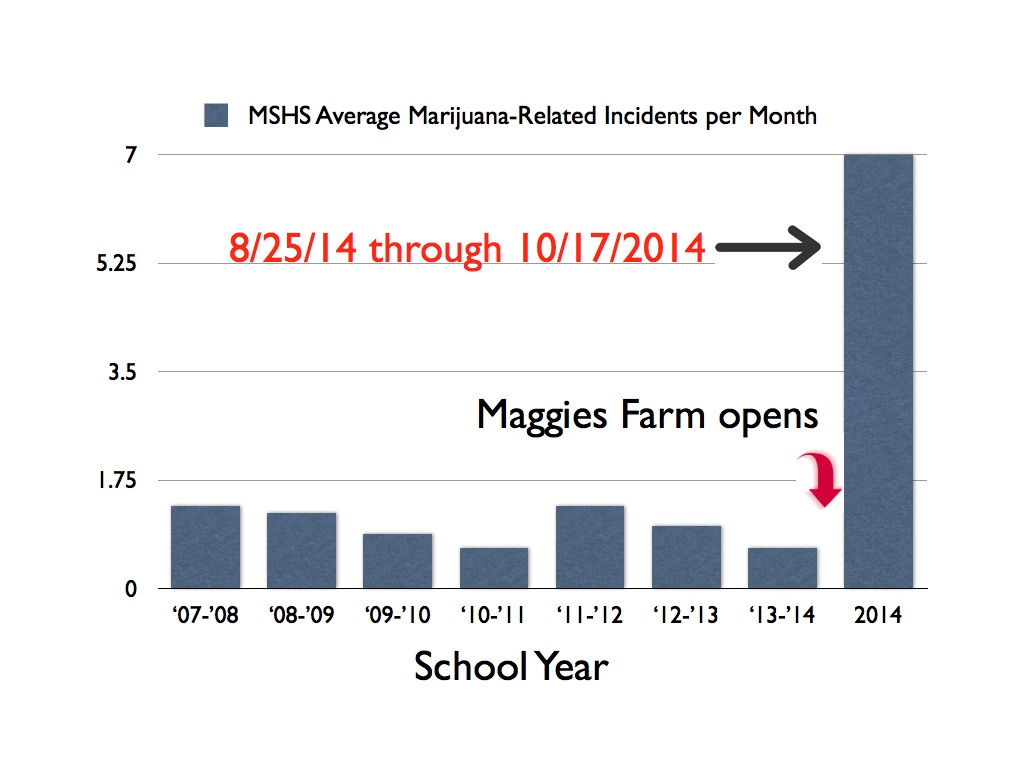As the small, Colorado town of Manitou Springs gears up for a city council vote that will determine whether marijuana stores can continue to operate within its limits, a physician there is reporting troubling numbers out of Manitou Springs High School.
After reviewing the results of his public-records requests, Dr. Kenneth Finn is urging city officials to consider not just tax revenues generated from marijuana sales, but also social costs associated with the drug’s use — especially social costs harming kids. Manitou Springs’ first recreational store opened Aug. 1 and reportedly will pay $223,122 in taxes for the period between July 31 and Oct. 7. At the same time, the store’s opening correlates with big problems, says Finn, a physician at Springs Rehabilitation who is board-certified in physical medicine and rehabilitation and pain medicine. Also a self-described “proud Manitou parent,” he reports:
– Marijuana-related problems at Manitou Springs High School have increased significantly this academic year. For the past seven school years, the school has reported an average of one marijuana-related incident per month. However, since school started Aug. 25, there already have been 14 marijuana-related incidents — an average of seven per month at the current rate.
– The number of homeless students — those reporting no stable, physical address — attending the school has doubled. The influx of homeless youth at the school is consistent with reports from Denver-area homeless shelters, including those focused on helping teens and young adults. (see video below)
“I thoroughly enjoy the community, but we have a real problem on our hands,” Finn said. “I wouldn’t consider this a social experiment because in an experiment, you actually care about data collection and analysis and the outcome. Right now, people will talk about tax revenue, but they’re not bothering to calculate the costs of marijuana.
“However, I do want to give thanks to the Manitou School District staff and teachers who are dedicated to the education and welfare of their students — and who were brave enough to even alert members of the public about these problems and hand over this public information quickly and in accordance with state law.”



what exactly is a “marijuana-related incident?” this is incredibly suspect “journalism” and even more suspicious “science”. this very article mocks the idea that CO and WA are ‘experiments’ yet the article itself cites data with no operational definitions of what a “marijuana-related incident” is. isn’t it ironic? dontcha think?
Regardless of how anyone feels about marijuana, surely we can all agree that school children should not use, sell, distribute or otherwise come into contact with the drug on a school campus. That is how a “marijuana-related incident” is defined. We also invite you to contact school officials to ask them about the marijuana-related incidents they consider so concerning.
Does anyone have the ability to measure academic performance stratified by pot users and non-pot users? It would seem we have sufficient availability of test subjects and controls and we certainly have standardized tests available.
Dr Finn is correct. Colorado’s dalliance with marijuana legalization is not an experiment. An experiment requires control of input variables and measurement of outcomes. Although pot shops are controlled (sort of), Department of Revenue data confirm that less than half of the pot used in Colorado comes from regulated sources. And the only outcome that is measured reliably is tax revenue.